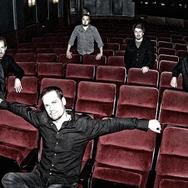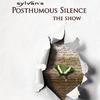Progressive Rock > Sylvan

For a lot of fans, their personal Sylvan-story starts with "Posthumous Silence". None of the band's other albums has made so many uncommited "part-time"-listeners instantly to enthusiastic devotees. In all relevant forums, you can often find statements like "I didn’t know the band before but then I listened to them on a festival and it just blew me away." Prog-magazine reviewers were enthused, too, and awarded top scores in a row.
But "Posthumous Silence" is not a resounding debut, but it is rather another milestone in a long history going back to the year 1991, when keyboarder Volker Söhl, guitarist Kay Söhl and drummer Matthias Harder were schoolmates in Hamburg and together founded a band. Singer and bassist in those days was Marko Heisig, but he left again soon to engage in other projects. When in 1995 Marco Glühmann joined the band (at that time still called "Chamäleon"), Matthias Harder and the Söhl-twins had finally found the charismatic voice they had been searching for so long. Together, they renamed the band as Sylvan – based on "Sylvanus", the god of woods and forests.
From the beginning on, the band's founders had committed themselves to strongly emotional melodies and opulent compositions like their sources of inspiration: Marillion, Genesis, Queen or Pink Floyd. And they kept this style under their new name as well. That was proven impressively when Sylvan released their first album "Deliverance" in 1999, with five of it's eight songs lasting close to ten minutes or even longer and being correspondingly complex.
Encouraged by a lot of positive feedbacks and success, Sylvan released "Encounters" already in May 2000, a CD that was much more mature and harder than it’s predecessor. Apart from two independent songs (including "No way out" that also appears on the album as a video clip) the CD features the ten-piece eponymous song that deals with the circle of life in the broadest sense.
Sylvan had engaged several bassists on demand until in spring 2000, Sebastian Harnack completed the band to care for the basslines permanently – just in time to join the "Encounters"-tour that lasted till spring 2002. The five musicians enthralled their audience not only in Germany, but also on several festivals all around Europe and even in Mexico. Another highlight was the performance of "Encounters – Das Rockballet" together with the "New Dance Project".
In October 2002, Sylvan released "Artificial Paradise", their third album. The eponymous song still belongs to the fans’ absolute favorites. The reviewers, too, gave Sylvan credit especially for this song’s outstanding quality and for the evolution of their music from one CD to the next. Although "Artificial Paradise" wasn't really a concept album, still all the songs dealt with the same subject: society's superficiality, deceitfulness and greed.
Sylvan had never given away many responsibilities, however, since their fourth album they produced every CD completely on their own. Compared to it's predecessor, "X-Rayed" sounds more rough and dark but still shows the unmistakable marks of Sylvan's music. On this album, too, the songs all embrace a single subject: each tells a story about people who try to cope with an emotionally encumbering situation. The release party in April 2004 was followed by an extensive tour through Germany and Europe (till winter 2005) with two outstanding events: the appearance at the "Rites of Spring Festival" in Phoenixville, USA, and the support of Marillion in Cologne.
Those highlights gave Sylvan important support to cope with the most productive year in their history until now. Producing two albums simultaneously, that couldn't be more different from each other, entailed an enormous and almost unbearable workload. But when the Five released the first of the two albums, "Posthumous Silence", in April 2006 they were more than rewarded for their efforts with an overwhelming positive feedback and sale counts far beyond expectations.
The level of enthusiasm even surprised Sylvan themselves, because at that time one couldn't foresee the trend towards concept albums that is visible now. And the CD’s sject – a father reads the diary of his dead daughter and learns for the first time about her desparation – as well as the complexity of the compositions could by all means have scared potential listeners off. Instead, the music as well as the story manages to enthrall the audience instantely and to touch everybody deeply in a unique way.
So "Posthumous Silence" already achieved what actually the next album called "Presets" was supposed to do – that is to make Sylvan's music known to a wider range of rock fans. But who knows – this CD (expected release: early 2007) with it’s shorter and more catchy songs is so distinct from "Posthumous Silence", that maybe it will find a whole lot of new fans, too … and then their personal Sylvan-story simply starts with "Presets" …

 Leaving Backstage - Live in Kampnagel
Leaving Backstage - Live in Kampnagel Posthumous Silence - The Show
Posthumous Silence - The Show LIVE combo pack
LIVE combo pack